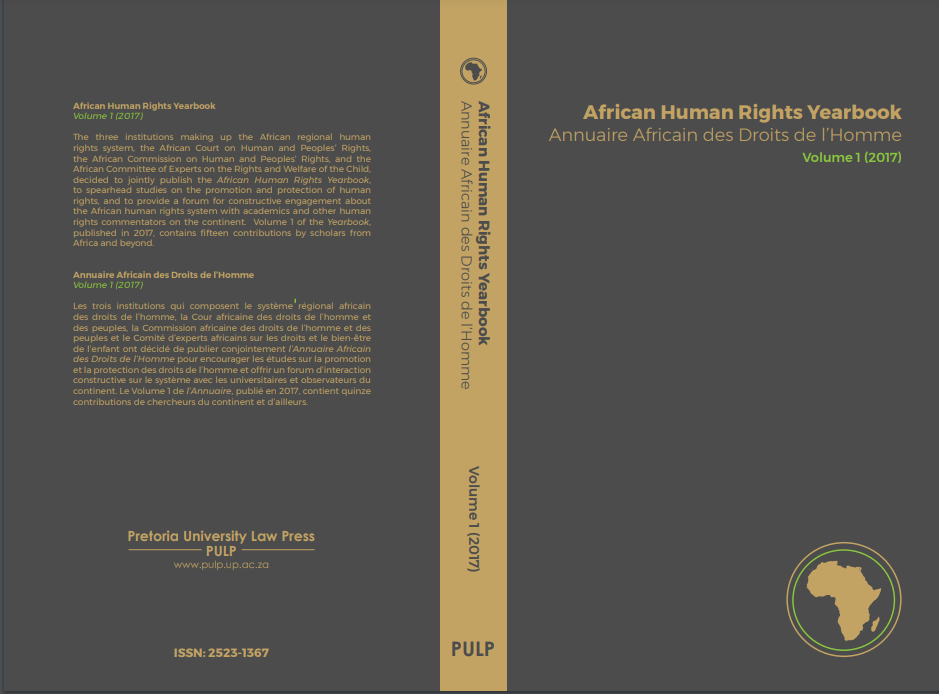Human rights in the African Union decision-making processes: An empirical analysis of states’ reaction to the Activity Reports of the African Commission on Human and Peoples’ Rights
DOI:
https://doi.org/10.29053/2523-1367/2018/v2n1a13الكلمات المفتاحية:
African Union، Activity Reports، consideration، states، policy organs، African Commissionالملخص
ABSTRACT: More than any other time in the history of the African Union, the past five years have witnessed discord and division between the African Commission on Human and Peoples’ Rights and the states that comprise the AU. Instead of constructive dialogue, confrontation and antagonism have prevailed during the consideration of the Commission’s Activity Reports, provoking adverse decisions that erode the standards in the African Charter on Human and Peoples’ Rights. Drawing in part on the author’s personal empirical observation of the dialogues before AU policy organs, the article endeavours to divulge states’ observations on the content of the Commission’s Activity Report as reflected during Ordinary Sessions of AU policy organs and to evaluate their appropriateness in light of the African regional human rights standards. It identifies that occasionally states conduct diplomacy adverse to human rights by deliberately advocating against the standards elaborated in the African Charter. Often, states use the consideration process of the Commission’s Activity Reports as a platform to control the Commission and censure its decisions rather than support it. Confrontation has been states’ favourite tactic to shield themselves from human rights accusations, reducing the impact of the Commission’s Activity Reports on domestic human rights in Africa.
TITRE ET RÉSUMÉ EN FRANÇAIS: Les droits de l’homme dans les processus décisionnels de l’Union africaine: Un aperçu de la réaction des États aux rapports d’activités de la Commission africaine des droits de l’homme et des peuples RÉSUMÉ: Plus que tout autre moment de l’histoire de l’Union africaine (UA), les cinq dernières années ont été marquées par des discordes et des divisions entre la Commission africaine des droits de l’homme et des peuples (Commission africaine) et les États membres de l’Union africaine. Au lieu d’un dialogue constructif, la confrontation et l’antagonisme ont prévalu lors de l’examen des rapports d’activités de la Commission, provoquant des décisions défavorables qui érodent les normes de la Charte africaine des droits de l’homme et des peuples. S’appuyant en partie sur l’observation personnelle de l’auteur lors des dialogues menés devant les organes politiques de l’UA, cet article s’efforce de présenter les observations des États sur le contenu du rapport d’activités présenté par la Commission lors des sessions ordinaires des organes politiques de l’UA et d’évaluer leur pertinence à la lumière des normes régionales africaines des droits de l’homme. L’article relève que parfois les États mènent une diplomatie contraire aux droits de l’homme en plaidant délibérément contre les normes élaborées dans la Charte africaine. Les États utilisent souvent le processus d’examen des rapports d’activités de la Commission comme une plate-forme permettant de contrôler la Commission et de censurer ses décisions au lieu de les appuyer. La confrontation est la tactique de prédilection des États pour se protéger des accusations relatives aux droits de l’homme, réduisant ainsi l’impact des rapports d’activités de la Commission sur la situation nationale des droits de l’homme en Afrique.


